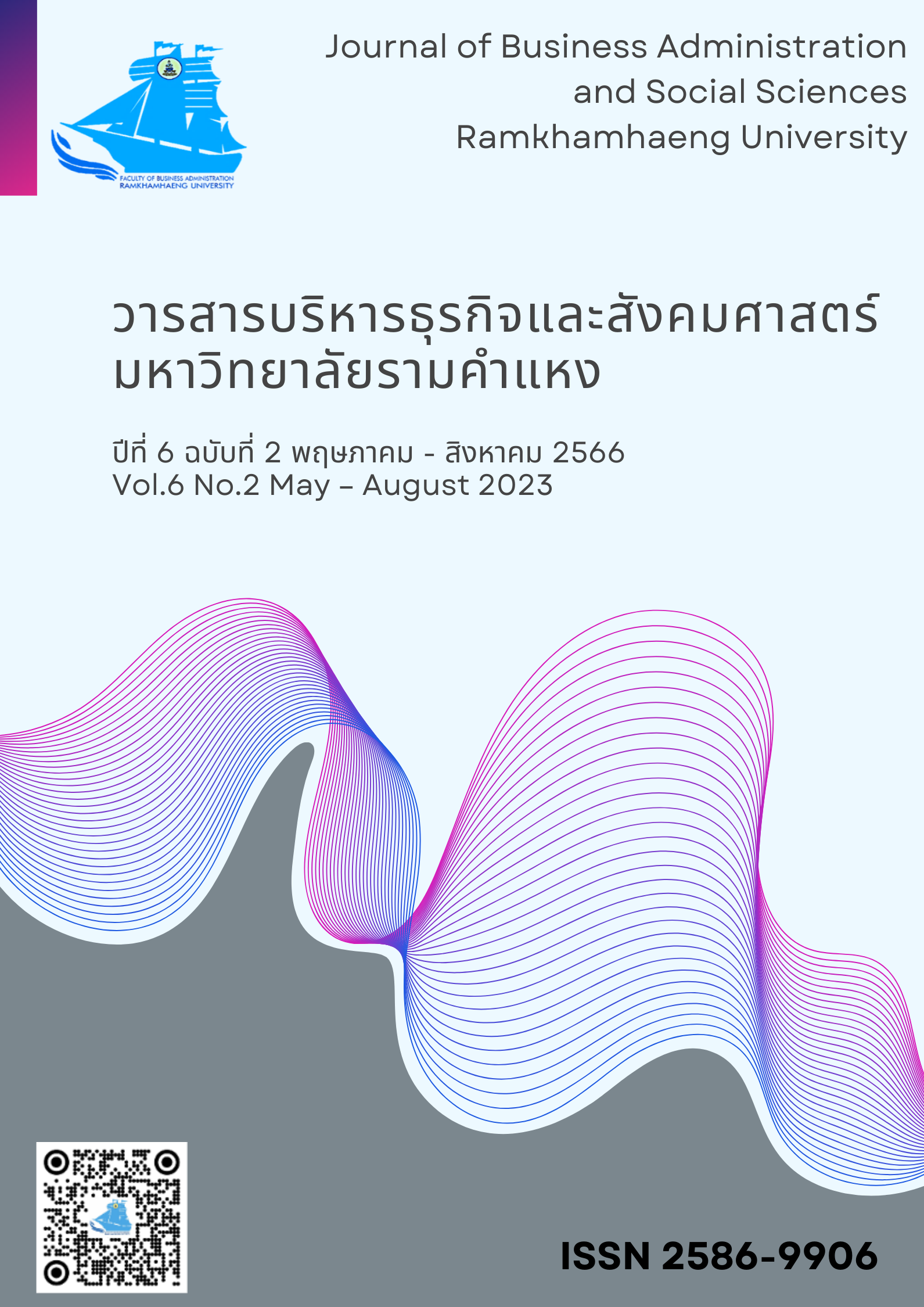The Influence of Tranformational Leadership Factors Affecting Knowledge Management of Construction Employees In Bangkok.
Main Article Content
Abstract
In this research investigation, the researchers examine transformational leadership factors influencing the knowledge management of construction employees in Bangkok. The research population were 396 construction employees using convenience sampling method. A questionnaire was used to collect data. The descriptive statistics consisting of percentage, mean, frequency, and standard deviation and multiple regressionstatistics were employed in data analysis.
Findings showed that: 1) Transformational leadership of construction employees in Bangkok was at a high level (Mean=3.60, S.D.=0.65). 2) Knowledge management of construction employees in Bangkok was at high level (Mean=3.59, S.D.=0.67). 3) The factors of transformational leadership positively influenced knowledge management as follows individualized consideration (β =0.34, p-value = 0.05), intellectual stimulation (β =0.32, p-value = 0.05), inspiration motivation (β =0.20, p-value = 0.05), and idealized influence (β =0.14, p-value = 0.05, respectively. The model could predict knowledge management at 27 percent (R Square = 0.27). The organization should develop inspiration motivation and knowledge adaptation to construction employees aged 25-30 years at a staff level and bachelor’s degree level to ensure a higher level of knowledge management efficiency.
Article Details

This work is licensed under a Creative Commons Attribution-NonCommercial-NoDerivatives 4.0 International License.
เนื้อหาและข้อมูลในบทความที่ลงตีพิมพ์ในวารสารบริหารธุรกิจและสังคมศาสตร์ มหาวิทยาลัยรามคำแหง ถือเป็นข้อคิดเห็นและความรับผิดชอบของผู้เขียนบทความโดยตรง ซึ่งกองบรรณาธิการไม่จำเป็นต้องเห็นด้วย หรือร่วมรับผิดชอบใดๆ
บทความ ข้อมูล เนื้อหา รูปภาพ ฯลฯ ที่ได้รับการตีพิมพ์ในวารสารบริหารธุรกิจและสังคมศาสตร์ มหาวิทยาลัยรามคำแหง ถือเป็นลิขสิทธิ์ของวารสารบริหารธุรกิจและสังคมศาสตร์ มหาวิทยาลัยรามคำแหง หากบุคคลหรือหน่วยงานใดต้องการนำบทความทั้งหมดหรือส่วนหนึ่งส่วนใดไปเผยแพร่ต่อ หรือเพื่อกระทำการใดๆ จะต้องได้รับอนุญาตเป็นลายลักษณ์อักษรจากวารสารบริหารธุรกิจและสังคมศาสตร์ มหาวิทยาลัยรามคำแหง ก่อนเท่านั้น
References
กรมพัฒนาธุรกิจการค้า.(2565). รายงานประจำปี ข้อมูลนิติบุคคล. สืบค้นจาก
https://www.dbd.go.th/dbdweb56/news
กัญญาวีณ์ โมกขาว.(2559). โมเดลความสัมพันธ์ระหว่างภาวะผู้นำการเปลี่ยนแปลง การสร้างความรู้กับ
ผลการดำเนินงานการจัดการนวัตกรรมของหอผู้ป่ายโรงพยาบาลชุมชน. วารสารพยาบาลศาสตร์และสาธารณสุข. 27(3), 1-211. สืบค้นจาก http://library.christian.ac.th /thesis/document/T041612.pdf
กัลยา วานิชย์บัญชา. (2555). การใช้ SPSS for Windows ในการวิเคราะห์ข้อมูล (พิมพ์ครั้งที่ 20).
กรุงเทพฯ: บริษัทธรรมสาร จำกัด.
เกตนภัส จิรารุ่งชัยกุล และ สุรสิทธิ์ อุดมธรรมวงศ์. (2563). ปัจจัยความสำเร็จในการดำเนินงาน
อุตสาหกรรมก่อสร้าง ขนาดกลางและขนาดย่อม ในเขตพื้นที่จังหวัดชลบุรี. งานประชุมวิชาการระดับชาติมหาวิทยาลัยรังสิต, 63(1), 1-9. สืบค้นจาก https://rsucon.rsu.ac.th /files/proceedings/nation2020/NA20-109.pdf
ชยพล อึงบวรตระกูล. (2563). ความเสี่ยงต่อการบริหารโครงการก่อสร้างอาคารในมุมมองผู้บริหารและ
ควบคุมการก่อสร้าง.วิทยานิพนธ์วิทยาศาสตร์มหาบัณฑิต, มหาวิทยาลัยศิลปากร.
ชารวี บุตรบำรุง, ธนสุวิทย์ ทับหิรัญรักษ์, และสมภูมิ แสวงกุล. (2556). อิทธิพลของภาวะผู้นำการ
เปลี่ยนแปลง การจัดการความรู้และนวัตกรรมที่มีต่อผลการดำเนินงานของธนาคารพาณิชย์. วารสารสมาคมนักวิจัย,18(3), 80-93. สืบค้นจาก https://so04.tci-thaijo.org
เดชา เดชะวัฒนไพศาสล, กฤษยา นุ่มพยา, จีรภา นวลลักษณ์, และชนพัฒน์ ปลื้มบุญ. (2557). การศึกษา
เจนเนอเรชั่นเอ็กซ์และเจนเนอเรชั่นวายในมุมมองต่อคุณลักษณะของตนเองและความคาดหวังต่อคุณลักษณะของเจนเนอเรชั่นอื่น. จุฬาลงกรณ์ธุรกิจปริทัศน์, 36(141), 1-17. สืบค้นจาก https://so03.tci-thaijo.org › article › download
ตลาดหลักทรัพย์แห่งประเทศไทย. (2565). รายงานประจำปี. สืบค้นจาก https://www.set.or.th/th/about/
overview/report/annual-report
ธนาคารแห่งประเทศไทย. (2565). รายงานแนวโน้มธุรกิจ ไตรมาสที่ 1/2565. สืบค้นจาก
https://www.bot.or.th/Thai/MonetaryPolicy/EconomicConditions/BLP
วนิดา ธนากรกุล, ศลิษา ธาระสวัสดิ์, ธนะเมศฐ์ เชาว์จินดารัชต, กัญญาภัค เงินอินต๊ะ, และวรยา ร้ายศรี
(2561). รูปแบบการถ่ายทอดความรู้สําคัญยิ่งยวดภายในและภายนอกศูนย์การแพทย์กาญจนาภิเษก ผ่านนิทรรศการ. วารสาร Mahidol R2R e-Journal, 5(1), 1-13.
สืบค้นจาก https:// he02.tci-thaijo.org/Wiig%2C+K.M.%2C1993
วริษฐ์ ทองจุไร และวิโรจน์ เจษฎาลักษณ์. (2558). อิทธิพลของภาวะผู้นำการเปลี่ยนแปลง ความยืดหยุ่น
เชิงกลยุทธ์ ศักยภาพด้านกระบวนการจัดการความรู้และความสามารถด้านการบริหารการเปลี่ยนแปลงต่อประสิทธิผลขององค์กร. วารสารมนุษยศาสตร์ สังคมศาสตร์และศิลปะ, 8(3), 1-18. สืบค้นจาก https:// www.he02.tci-thaijo.org/ Journal/article/view/48958
สมนึก เพชรช่วย และสมเดช สิทธิ์พงค์พิทยา. (2560). ภาวะผู้นำการเปลี่ยนแปลง การจัดการความรู้
องค์การแห่งการเรียนรู้ และพฤติกรรมการทำงานเชิงนวัตกรรมในโรงเรียนสังกัดสำนักงาน
พื้นที่การศึกษามัธยมศึกษา เขต 1,2,3,4,และ 6. วารสารสมาคมนักวิจัย, 22(1),193-203.
สืบค้นจาก https://so04.tci-thaijo.org
สุธรรม สิกขาจารย์, ทัศนีย์ ช่อเทียนทิพย์, วิรัตน์ มณีพฤกษ์, และนำพล ม่วงอวยพร. (2562). การทบทวน
แนวคิดการจัดการความรู้ในองค์กร A revisit of concepts of knowledge management in organizations. วารสารวิชาการ การจัดการภาครัฐและเอกชน,1(1). 13-25. สืบค้นจาก https://so02.tci- thaijo.org/index.php/appm/article/download/253729
สุชาติ ประสิทธิ์รัฐสินธุ์. (2550). ระเบียบวิธีการวิจัยทางสังคมศาสตร์ (พิมพ์ครั้งที่ 12). กรุงเทพฯ
บริษัทเฟื่องฟ้า พริ้นติ้ง.
สำนักงานสภาพัฒนาการเศรษฐกิจและสังคมแห่งชาติ. (2565). ผลิตภัณฑ์มวลรวมโดยในประเทศสืบค้น
จาก https://www.nesdc.go.th/main. php?filename=qgdp_page
สำนักงานสถิติแห่งชาติ. (2565). ข้อมูลสถิติที่สำคัญ สถิติแรงงาน. สืบค้นจาก from http://statbbi.
nso.go.th /staticreport/page/sector/th/02.aspx:
Abidali, A. F., & Harris, F. (1995). A methodology for predict company failure in the construction
Industry. Construction Management and Economics, 13(3), 189-196. Retrieved from https://www.semanticscholar.org/paper/A-methodology-for-predicting
Adogbo, K.J., & Kolo, B. A. (2017). Assuagement of organizational leadership for knowledge
management practice in the Nigerian construction industry. Journal of Construction Project Management and Innovation, 7(1),1977-1994. Retrieved from https://journals.uj.ac.za/index.php/JCPMI/article/view/148/139
Aldulaimi, S. H. (2015). The impact of leadership, organizational culture, and strategy on
knowledge management in GCC countries. Information and Knowledge Management, 5(6), 17-27. Retrieved from https://www.researchgate.net/publication/305209270
Bass, B. M. (1985). Leadership and Performance beyond Expectations. New York Free Press,
Bass, B. M., & Avolio, B. J. (2004). Multifactor leadership questionnaire: Manual and Sampler :
Mind Garden. Journal of Leadership. 3(2),1-14. Retrieved from https:// dx.doi.org/10.1207/s1532754xjprr1602_2
Burns, J. M. (1978). Leadership. New York: Harper and Row. Journal of Philosophy, 3(3), 1-18.
Retrieved from https:// www.scirp.org/(S(i43dyn45teexjx455qlt3d2q
Carrillo P. M., & Aighassani A. M., & Anumba C. J. (2014). Knowledge management strategy for
construction: key i.t. and contextual issues. Construction Informatics Digital Library. 2(2), 1-12. Retrieved from http://itc.scix.net/ p paper w78-2000
Crawford, C. B. (2005). Effects of transformational leadership and organizational position on
knowledge management. Journal of Knowledge Management, 9(6), 6-16.
Retrieved from https://www.researchgate.net/publication/220363595
Gathii, R. W. & Obonyo, P. K. (2018). Transformational leadership, knowledge management and
performance of telecommunication firms in Kenya. International Journal of Business and Social Science, 9(2), 20-38. Retrieved from https://ijbssnet.com/journals/Vol_9_No_2_February_2018/5.pdf
Hesham, S. M. (2011). Development of KM model for knowledge management implementation
and application in construction projects. Engineering and Physical Sciences, e thesis,1-294. Retrieved from https://www. etheses.bham.ac.uk/id/print/1307
Hoseini, S. A., & Nikabadi, M. S., & Seyed, A. M. (2016). The role of transformational leadership
and knowledge management processes on the rate of organisational innovation. International Journal of Knowledge Management Studies, 1(1), 64-75. Retrieved
from https://www.elsevier.es › pie=S164599111300039X
Marquardt, M. J. (1996). Building the learning organization: a system approach to quantum
improvement and global success. Open Access Library Journal, 8(5), 1-19.
Sahban, M. A. (2019). The transformational leadership, knowledge management and perceived
organizational support in predicting innovation capability. Polish Journal of Management Studies, 20(1), 372-381. Retrieved from https://www.researchgate.net/publication/338478143
Sayyadi, M. & Provitera M. J. (2019). The transformational leader's role in organizational design
and knowledge management performance. International Leadership Journal, 11(3), 62–82. Retrieved from http://internationalleadershipjournal.com/wp-content/uploads/2019
Wiig, K. M. (1993). Knowledge management foundations: thinking about thinking: how people
and organizations create, represent, and use knowledge. Schema Press (Limited). Retrieved from https://www.researchgate.net/publication/31672277
Zywiotek, J. C., & Tucmena, E. R., & Isac, N. C., & Tucmena, A. L. (2022). Nexus of of
transformational leadership, employee adaptiveness, knowledge sharing, and employee creativity. Sustainability 2022, 14(18), 116-127. Retrieved from https://doi.org/10.3390/su141811607


